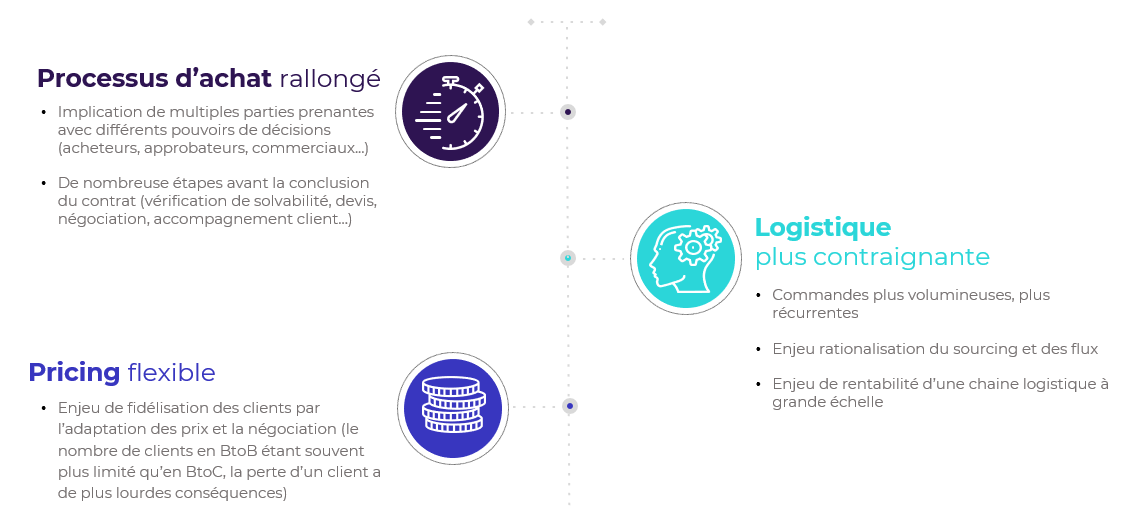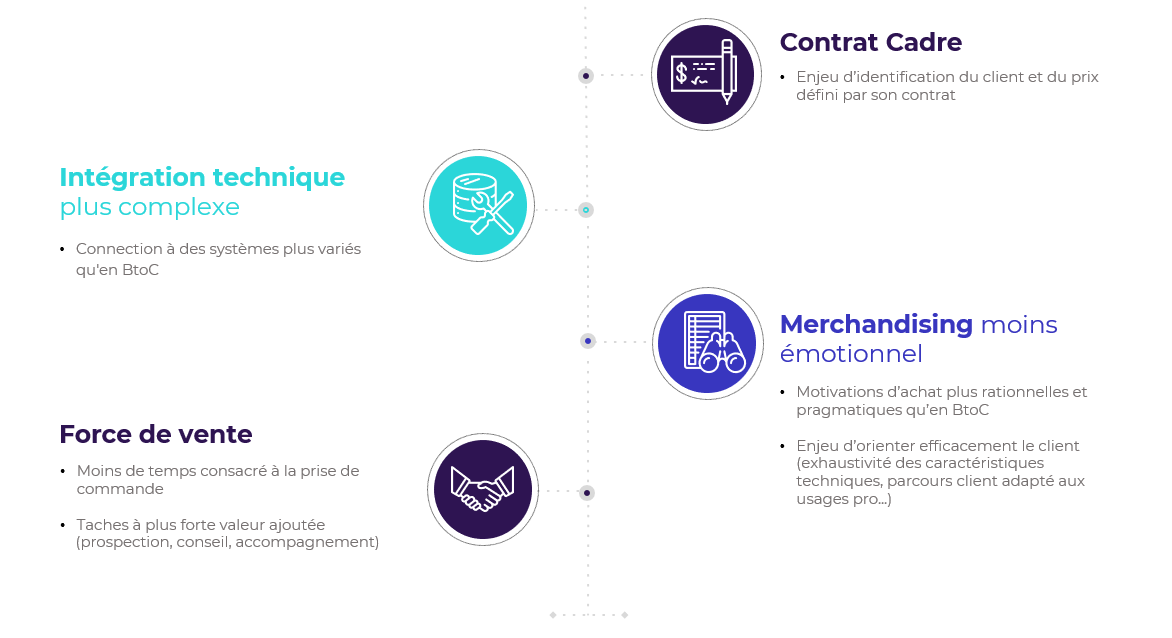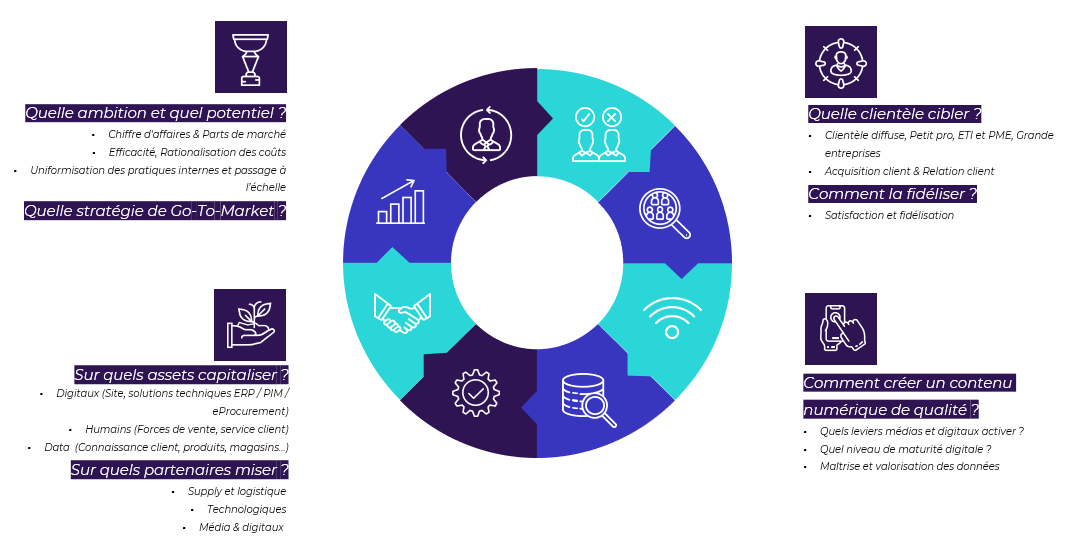Launching Your B2B E-commerce Business: Opportunities and Challenges
Since the Covid crisis, the significance of e-commerce in our lives as consumers is undeniable. The halt of certain activities and social distancing during the pandemic heightened the interest of many companies in developing an online presence.
However, online sales in the B2B market have generally lagged behind consumer-facing activities, despite B2B being a much larger market (already generating €600 billion in revenue, six times more than B2C in France)*. B2B e-commerce is thus a vast playground with high disruptive potential, expected to undergo significant changes in the coming years.
In this article, Converteo aims to unpack the stakes of e-commerce transformation in the B2B market and the challenges that come with it.
A Promising and Rapidly Evolving Market
Despite the current economic slowdown, the B2B e-commerce market is thriving. According to the latest Xerfi study on the subject, the sector « already accounts for 23% of the activity of French companies with more than 10 employees, and the audience for B2B e-commerce websites surged by 40% between September 2019 and January 2021 »*1. Additionally, this trend is expected to continue: « 34% of B2B e-commerce site customers believe that the health crisis has led them to increase online orders at the expense of other channels. More than 2/3 of them believe that this shift of orders to the e-commerce channel is now permanent. »”*2.
Since the End of the Covid Crisis, Three Major Trends Have Emerged :
- A Strong Digitalization of B2B Purchasing Habits : The current economic context has refocused business demands on the fundamentals: price, choice, and logistics. Today, e-commerce, which simplifies the comparison of offers and promotions, provides access to negotiated rates, and automates part of the procurement process, is becoming the preferred channel for B2B customers. There is, therefore, a real urgency for traditional players in the sector to digitize their catalogs. It’s crucial to jump on board now, or risk losing market share tomorrow to new entrants. This is exactly what is happening in the construction industry, where startups like Breek are revolutionizing the productivity of a sector where, even today, « one-third of independent contractors time is spent sourcing building materials»*4.
- A Growing Dominance of Web Giants in the B2B Market : Pure players like Amazon and Alibaba are increasingly strengthening their presence in B2B e-commerce through their marketplaces. The breadth of their offerings, combined with the power of their logistics, makes them strong competitors for traditional wholesalers and retailers in the sector. They are also expanding their influence through various services offered throughout the purchasing journey (payment solutions, voice assistants, etc.).
- Greater Vertical Integration of Manufacturers through E-commerce :
- Increasingly, manufacturers are venturing into D2C (direct-to-consumer) sales via their own online sales platforms. This approach allows them to offer comprehensive solutions that include many services associated with the equipment sold, which distributors may not always be able to provide. This development strategy, already adopted by companies such as Schneider Electric, also enables better control over customer knowledge and data, strategic assets for driving personalization and customer loyalty.*1
- Other Players Are Taking It a Step Further by Launching Their Own Marketplaces: This is the case with Thales, which has launched Iven (Intermedia Vendor Enterprise). The marketplace connects suppliers of spare parts and consumables (150,000 references) with manufacturers in the aerospace and defense sectors. The group has leveraged its expertise and reputation to position itself as an intermediary and trusted third party in sensitive markets such as aerospace and defense. This new role as an intermediary provides Thales with new revenue streams (including sales commissions) and aims to streamline transactions, reduce procurement costs (product costs and administrative processing costs), and shorten delivery times.*1
For B2B companies, the question is no longer when to make the transition to e-commerce, but how to implement it:
Drawing Inspiration from B2C Maturity and Practices
For B2B companies, the challenge is to offer B2B customers a shopping experience that matches the level of demand found in B2C: more online, more mobile, and more personalized. According to the latest McKinsey study on the topic, « B2B buyers want control and choice in how they interact with salespeople »*5. It is not about abandoning traditional sales channels but offering clients a choice in their experience. This omnichannel strategy must ensure seamless integration across different touchpoints. A smooth and consistent purchasing journey needs to be maintained between online and offline channels (agencies, call centers, mobile apps, etc.).
We have supported ManoMano, which has effectively addressed this challenge by centering the customer experience in the development of its site and mobile app for construction professionals. This includes offering personalized pathways based on the professional’s specialty or search history.
Accounting for B2B Specificities in E-commerce Transformation
To meet the growing demands of B2B stakeholders, companies must also incorporate the specificities of the sector into their e-commerce strategy, which differ from the characteristics of B2C e-commerce :


Asking the Right Questions Before Launching
Starting with the level of ambition assigned to the sales digitization project:
- The defensive approach aims to maintain current market share by replicating physical offerings to retain existing customers.
- The offensive approach seeks to leverage B2B e-commerce transformation to differentiate from competitors and gain market share. This involves evolving the product and service offerings and processes to attract new customers.
Starting your e-commerce transformation today to secure market share tomorrow requires a medium- and long-term vision on these various topics:

Converteo assists numerous companies in defining and implementing their digital strategies, from strategic planning to technical deployment, including the operation of e-commerce levers.
Sources :
*1 Xerfi, “Les stratégie de croissance dans le e-commerce B2B”, 03/2021
*2 BFMTV, “Le e-commerce B2B accélère et passe devant le B2C”, 07/2022
*3 Next Content, “L’impact de la crise Covid-19 sur les pratiques d’achats des entreprises”,01/2021
*4 BFMTV, “Supervan lance Breek, sa marketplace dédiée à l’achat express de matériaux”, 10/2022
*5 B2B Leaders, “McKinsey : plus de canaux = plus de ventes dans le B2B”, 03/2022



